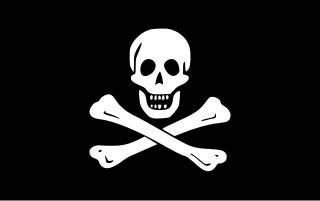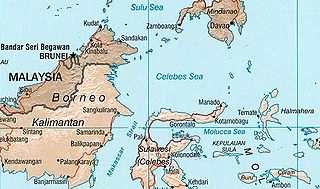
The Gulf of Guinea is the northeasternmost part of the tropical Atlantic Ocean from Cape Lopez in Gabon, north and west to Cape Palmas in Liberia. The intersection of the Equator and Prime Meridian is in the gulf.

Piracy is an act of robbery or criminal violence by ship or boat-borne attackers upon another ship or a coastal area, typically with the goal of stealing cargo and other valuable goods. Those who conduct acts of piracy are called pirates, vessels used for piracy are pirate ships. The earliest documented instances of piracy were in the 14th century BC, when the Sea Peoples, a group of ocean raiders, attacked the ships of the Aegean and Mediterranean civilisations. Narrow channels which funnel shipping into predictable routes have long created opportunities for piracy, as well as for privateering and commerce raiding. Historic examples include the waters of Gibraltar, the Strait of Malacca, Madagascar, the Gulf of Aden, and the English Channel, whose geographic structures facilitated pirate attacks. The term piracy generally refers to maritime piracy, although the term has been generalized to refer to acts committed on land, in the air, on computer networks, and outer space. Piracy usually excludes crimes committed by the perpetrator on their own vessel, as well as privateering, which implies authorization by a state government.

The Golden Age of Piracy is a common designation for the period between the 1650s and the 1730s, when maritime piracy was a significant factor in the histories of the North Atlantic and Indian Oceans.
Maritime security is an umbrella term informed to classify issues in the maritime domain that are often related to national security, marine environment, economic development, and human security. This includes the world's oceans but also regional seas, territorial waters, rivers and ports, where seas act as a “stage for geopolitical power projection, interstate warfare or militarized disputes, as a source of specific threats such as piracy, or as a connector between states that enables various phenomena from colonialism to globalization”. The theoretical concept of maritime security has evolved from a narrow perspective of national naval power projection towards a buzzword that incorporates many interconnected sub-fields. The definition of the term maritime security varies and while no internationally agreed definition exists, the term has often been used to describe both existing, and new regional and international challenges to the maritime domain. The buzzword character enables international actors to discuss these new challenges without the need to define every potentially contested aspect of it. Maritime security is of increasing concern to the global shipping industry, where there are a wide range of security threats and challenges. Some of the practical issues clustered under the term of maritime security include crimes such as piracy, armed robbery at sea, trafficking of people and illicit goods, illegal fishing or marine pollution. War, warlike activity, maritime terrorism and interstate rivalry are also maritime security concerns.

Piracy in the Gulf of Guinea affects a number of countries in West Africa as well as the wider international community. By 2011, it had become an issue of global concern. Pirates in the Gulf of Guinea are often part of heavily armed criminal enterprises, who employ violent methods to steal oil cargo. In 2012, the International Maritime Bureau, Oceans Beyond Piracy and the Maritime Piracy Humanitarian Response Program reported that the number of vessels attacks by West African pirates had reached a world high, with 966 seafarers attacked during the year. According to the Control Risks Group, pirate attacks in the Gulf of Guinea had by mid-November 2013 maintained a steady level of around 100 attempted hijackings in the year, a close second behind the Strait of Malacca in Southeast Asia. Piracy in the Gulf of Guinea continues to be a concern to the shipping industry, which is affected significantly. At the same time, governments in the region generally highlight that the fight against piracy requires a broad understanding of maritime security throughout the Gulf of Guinea.

The Seamen's Church Institute (SCI)--formerly the Seamen's Church Institute of New York and New Jersey (1976-2022)--founded in lower Manhattan in 1834 and affiliated with the Episcopal Church, serves mariners through education, pastoral care, and legal advocacy. With a budget of over $7 million, SCI is the largest, most comprehensive mariners’ agency in North America. Headquartered in New York, NY, the Institute operates a seafarers’ center in Port Newark, and maritime education facilities in Paducah, Kentucky, and Houston, Texas.
Piracy off the coast of Somalia occurs in the Gulf of Aden, Guardafui Channel and Somali Sea, in Somali territorial waters and other surrounding places and has a long and troubled history with different perspectives from different communities. It was initially a threat to international fishing vessels during the early 2000s, only to rapidly escalate and expand to international shipping during the War in Somalia (2006–2009).
The MV Biscaglia was a chemical tanker managed by Ishima Pte. Ltd. of Singapore and held by Industrial Shipping Enterprises Management Company LLC of Stamford, Connecticut, USA.
Clipper Group is an international shipping company, founded in 1991 by Torben Gülnar Jensen, after a split of Armada Shipping A/S, which was founded in 1972 together with Jørgen Dannesboe.

United Nations Security Council Resolution 1950, adopted unanimously on November 23, 2010, after recalling previous resolutions on the situation in Somalia, including resolutions 1814 (2008), 1816 (2008), 1838 (2008), 1844 (2008), 1846 (2008), 1851 (2008), 1897 (2009) and 1918 (2010); the Council re-authorised states to intervene in acts of piracy by Somali pirates at sea for a further period of twelve months.

Piracy in the 21st century has taken place in a number of waters around the world, including the Gulf of Guinea, Strait of Malacca, Sulu and Celebes Seas, Indian Ocean, and Falcon Lake.

JS Ōnami (DD-111) is the second vessel of the Takanami-class destroyers of the Japan Maritime Self-Defense Force (JMSDF).

JS Makinami (まきなみ) is the third vessel of the Takanami-class destroyers of the Japan Maritime Self-Defense Force (JMSDF).

The Sulu and Celebes Seas, a semi-enclosed sea area and porous region that covers an area of space around 1 million square kilometres, have been subject to illegal maritime activities since the pre-colonial era and continue to pose a maritime security threat to bordering nations up to this day. While piracy has long been identified as an ubiquitous challenge, being historically interwoven with the region, recent incidents also include other types of maritime crimes such as kidnapping and the trafficking of humans, arms and drugs. Attacks mostly classify as 'armed robbery against ships' according to the United Nations Convention on the Law of the Sea as they occur in maritime zones that lie under the sovereignty of a coastal state. Incidents in the Sulu and Celebes Seas specifically involve the abduction of crew members. Since March 2016, the Information Sharing Centre (ISC) of the Regional Cooperation Agreement on Combating Piracy and Armed Robbery against Ships in Asia (ReCAAP) reports a total of 86 abuctions, leading to the issue of a warning for ships transpassing the area.

Operation Ocean Shield was NATO's contribution to Operation Enduring Freedom – Horn of Africa (OEF-HOA), an anti-piracy initiative in the Indian Ocean, Guardafui Channel, Gulf of Aden and Arabian Sea. It follows the earlier Operation Allied Protector. Naval operations began on 17 August 2009 after being approved by the North Atlantic Council, the program was terminated on 15 December 2016 by NATO. Operation Ocean Shield focused on protecting the ships of Operation Allied Provider, which transported relief supplies as part of the World Food Programme's mission in the region. The initiative also helped strengthen the navies and coast guards of regional states to assist in countering pirate attacks. Additionally, China, Japan and South Korea sent warships to participate in these activities.
Piracy has taken place in a maritime area bounded by Suez and the Strait of Hormuz, in the region around the Horn of Africa, and waters surrounding the Arabian Peninsula; in the region of the Indian Ocean from the Red Sea through the Arabian Sea to the Gulf of Oman.
As a practice of piracy, petro-piracy, also sometimes called oil piracy or petrol piracy, is defined as “illegal taking of oil after vessel hijacks, which are sometimes executed with the use of motorships” with huge potential financial rewards. Petro-piracy is mostly a practice that is connected to and originates from piracy in the Gulf of Guinea, but examples of petro-piracy outside of the Gulf of Guinea is not uncommon. At least since 2008, the Gulf of Guinea has been home to pirates practicing petro-piracy by targeting the region's extensive oil industry. Piracy in the Gulf of Guinea has risen in the last years to become the hot spot of piracy globally with 76 actual and attempted attacks, according to the International Maritime Bureau (IMB). Most of these attacks in the Gulf of Guinea take place in inland or territorial waters, but recently pirates have been proven to venture further out to sea, e.g. crew members were kidnapped from the tanker David B. 220 nautical miles outside of Benin. Pirates most often targets vessels carrying oil products and kidnappings of crew for ransom. IMB reports that countries in the Gulf of Guinea, Angola, Benin, Cameroon, Equatorial Guinea, Ghana, Guinea, Ivory Coast, Togo, Congo, and, especially, Nigeria, have experienced petro-piracy and kidnappings of crew as the most common trends of piracy attacks in the Gulf of Guinea.
Danish shipping's counter-piracy strategy is necessary as Denmark operates one of the world's five largest shipping nations in terms of operated fleet, controlling around 10% of global shipping. At any given time, there are approximately 70 Danish-controlled ships in the Indian Ocean and 30 ships in the Gulf of Guinea. This makes piracy in these areas is a significant concern for the Danish shipping industry and for the Danish state. In 2012, when Somali piracy was at its height, the piracy cost of Danish shipping was estimated to be between 130 and 260 million Euros.